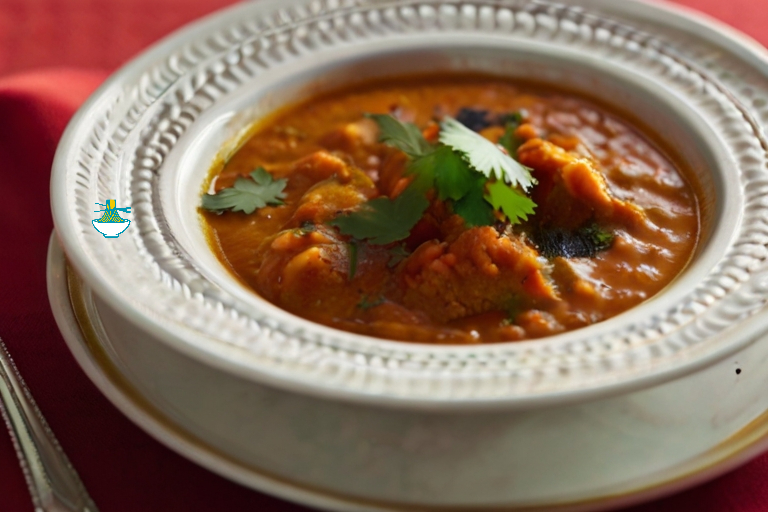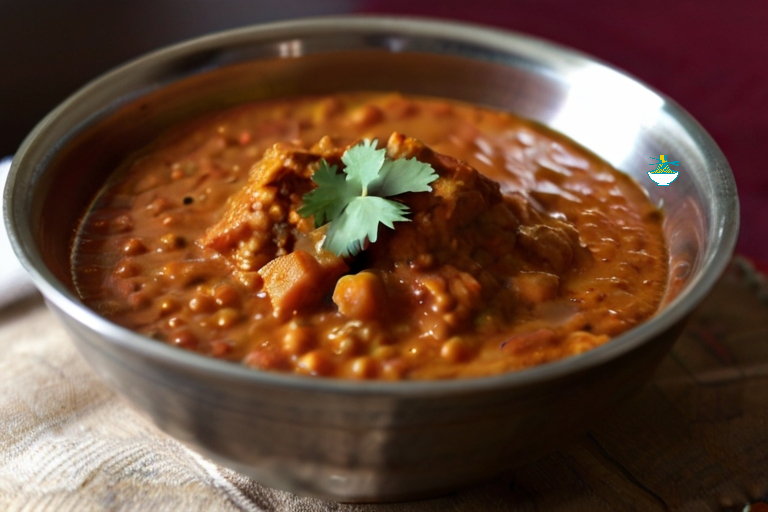Dulet is a bold and flavorful Ethiopian dish that combines finely chopped organ meats such as liver, tripe, and heart, seasoned with vibrant spices like berbere and mitmita. This traditional dish is often enjoyed with injera, Ethiopia’s signature sourdough flatbread, offering a complete sensory experience of the country’s rich culinary traditions.

Dulet is packed with protein, iron, and essential vitamins such as A, B12, and folate, thanks to the organ meats. The dish also provides healthy fats from niter kibbeh (clarified butter) and antioxidants from spices like berbere. Injera complements the dish by supplying fiber, carbohydrates, and additional minerals such as magnesium.
Due to the high cholesterol content in organ meats, individuals with heart concerns should moderate consumption. Additionally, the heat from spices like mitmita may not suit everyone’s palate. A healthier variation could include substituting some of the organ meats with lean cuts of beef, reducing butter, or pairing with whole-grain bread for a lighter meal option.

Ingredients:
- 250 g beef liver
- 250 g beef tripe
- 150 g beef heart (optional)
- 1 large onion, finely chopped
- 3 garlic cloves, minced
- 2-3 green chilies, finely chopped
- 2 tbsp clarified butter (niter kibbeh) or vegetable oil
- 1 tbsp berbere spice blend
- 1 tsp mitmita spice blend (optional for extra heat)
- Salt to taste
- Injera or crusty bread for serving
Instructions:
1. Rinse the liver, tripe, and heart thoroughly under cold water, removing any debris. Pat dry with paper towels and chop into small, uniform pieces.
2. Heat the niter kibbeh or vegetable oil in a large skillet over medium heat.
3. Add the chopped onion and sauté until translucent, about 3-4 minutes.
4. Stir in the garlic and chilies, cooking for 1-2 minutes until fragrant.
5. Add the chopped organ meats, stirring well to combine with the onions and garlic.
6. Sprinkle the berbere spice blend and, if desired, mitmita over the meat mixture. Stir until the spices evenly coat the meat.
7. Cook the mixture over medium heat for 10-15 minutes, stirring occasionally, until the meat is tender and fully cooked.
8. Taste and adjust seasoning with salt if needed.
9. Remove from heat and allow the dish to rest for a few minutes.
10. Serve hot with injera or crusty bread to scoop up the flavorful mixture.
Nutritional Considerations and Alternatives
Dulet is rich in protein, iron, and essential vitamins such as A and B12, promoting energy and red blood cell production. However, due to the high cholesterol content of organ meats, it’s recommended to enjoy Dulet in moderation, especially for individuals monitoring their heart health.
For a healthier version, you could replace some organ meats with lean beef or chicken breast. Pairing Dulet with whole-wheat bread instead of injera can provide additional fiber, making it a balanced meal option.
Nutrition Value:
1. 250 g beef liver
- Calories: 410
- Carbohydrates: 8 g
- Protein: 60 g
- Fat: 11 g
- Sodium: 100 mg
- Cholesterol: 560 mg
- Vitamins: High in vitamin A, B12, riboflavin, and folate
- Minerals: Rich in iron, zinc, phosphorus, and copper
- Nutritional benefit: Beef liver is nutrient-dense, promoting red blood cell formation, boosting immune function, and supporting healthy vision due to its high vitamin A content.
2. 250 g beef tripe
- Calories: 250
- Carbohydrates: 0 g
- Protein: 43 g
- Fat: 4 g
- Sodium: 90 mg
- Cholesterol: 200 mg
- Vitamins: Contains vitamin B12 and niacin
- Minerals: Good source of zinc, selenium, and phosphorus
- Nutritional benefit: Tripe provides high-quality protein while being low in fat. It supports muscle maintenance and boosts immune health.
3. 150 g beef heart (optional)
- Calories: 210
- Carbohydrates: 0 g
- Protein: 32 g
- Fat: 7 g
- Sodium: 95 mg
- Cholesterol: 270 mg
- Vitamins: Contains vitamins B12, B6, and riboflavin
- Minerals: Rich in iron, zinc, phosphorus, and selenium
- Nutritional benefit: Beef heart offers lean protein, essential vitamins, and coenzyme Q10, which benefits cardiovascular health.
4. 1 large onion, finely chopped
- Calories: 45
- Carbohydrates: 11 g
- Protein: 1.2 g
- Fat: 0.1 g
- Sodium: 4 mg
- Cholesterol: 0 mg
- Vitamins: Contains vitamin C, B6, and folate
- Minerals: Good source of potassium and manganese
- Nutritional benefit: Onions have antioxidant and anti-inflammatory properties, supporting immune health and cardiovascular function.
5. 3 garlic cloves, minced
- Calories: 13
- Carbohydrates: 3 g
- Protein: 0.6 g
- Fat: 0.1 g
- Sodium: 1.5 mg
- Cholesterol: 0 mg
- Vitamins: Contains vitamin C and B6
- Minerals: Contains manganese, calcium, and selenium
- Nutritional benefit: Garlic has antimicrobial, anti-inflammatory, and heart-protective benefits, promoting immune health and reducing blood pressure.
6. 2-3 green chilies, finely chopped
- Calories: 18
- Carbohydrates: 4 g
- Protein: 0.9 g
- Fat: 0.2 g
- Sodium: 7 mg
- Cholesterol: 0 mg
- Vitamins: High in vitamin C and vitamin A
- Minerals: Contains potassium and iron
- Nutritional benefit: Green chilies enhance metabolism, provide antioxidants, and contribute to improved immune function.
7. 2 tbsp clarified butter (niter kibbeh) or vegetable oil
- Calories: 200 (clarified butter) / 240 (vegetable oil)
- Carbohydrates: 0 g
- Protein: 0 g
- Fat: 22 g
- Sodium: 0 mg
- Cholesterol: 60 mg (clarified butter) / 0 mg (vegetable oil)
- Vitamins: Contains small amounts of vitamin E and A (clarified butter)
- Minerals: Minimal mineral content
- Nutritional benefit: Provides healthy fats for energy; niter kibbeh offers a rich flavor, while vegetable oil provides heart-friendly fats if used in moderation.
8. 1 tbsp berbere spice blend
- Calories: 25
- Carbohydrates: 6 g
- Protein: 1 g
- Fat: 0.5 g
- Sodium: 15 mg (varies with blend)
- Cholesterol: 0 mg
- Vitamins: Contains vitamin A, vitamin C (from chili), and trace amounts of B vitamins
- Minerals: Trace amounts of iron and calcium
- Nutritional benefit: Berbere provides antioxidants from spices like chili and paprika, promoting anti-inflammatory benefits.
9. 1 tsp mitmita spice blend (optional)
- Calories: 10
- Carbohydrates: 2 g
- Protein: 0.5 g
- Fat: 0.2 g
- Sodium: 5 mg
- Cholesterol: 0 mg
- Vitamins: Contains vitamin A and C from chili
- Minerals: Trace amounts of potassium and iron
- Nutritional benefit: Mitmita offers metabolism-boosting properties and adds heat, which can enhance digestion.
10. Salt to taste
- Calories: 0
- Carbohydrates: 0 g
- Protein: 0 g
- Fat: 0 g
- Sodium: 2325 mg per teaspoon (if fully used)
- Cholesterol: 0 mg
- Vitamins: None
- Minerals: Provides sodium
- Nutritional benefit: Sodium is essential for maintaining fluid balance, but excess intake can contribute to high blood pressure.
11. Injera or crusty bread for serving
- Calories: 210 (injera, per piece) / 130 (crusty bread, per slice)
- Carbohydrates: 42 g (injera) / 26 g (bread)
- Protein: 7 g (injera) / 4 g (bread)
- Fat: 1 g (injera) / 2 g (bread)
- Sodium: 300 mg (injera) / 230 mg (bread)
- Cholesterol: 0 mg
- Vitamins: Contains B vitamins (niacin, folate)
- Minerals: Good source of iron and magnesium (injera)
- Nutritional benefit: Injera offers complex carbohydrates and some protein, while bread provides energy and fiber, supporting satiety and digestion.


Comments